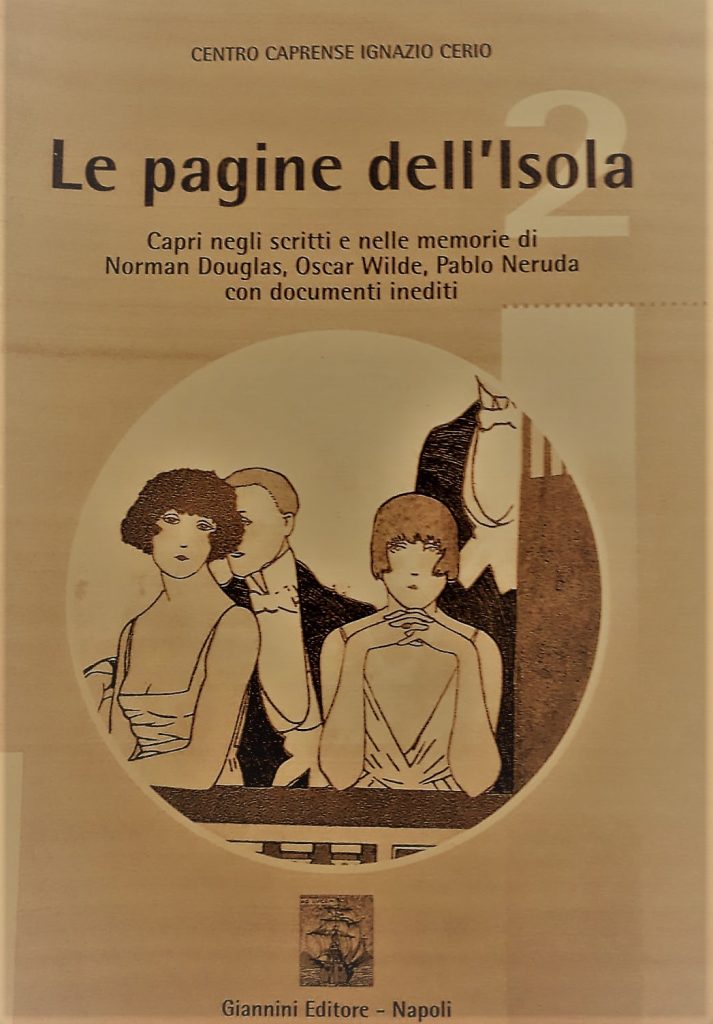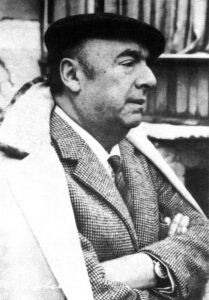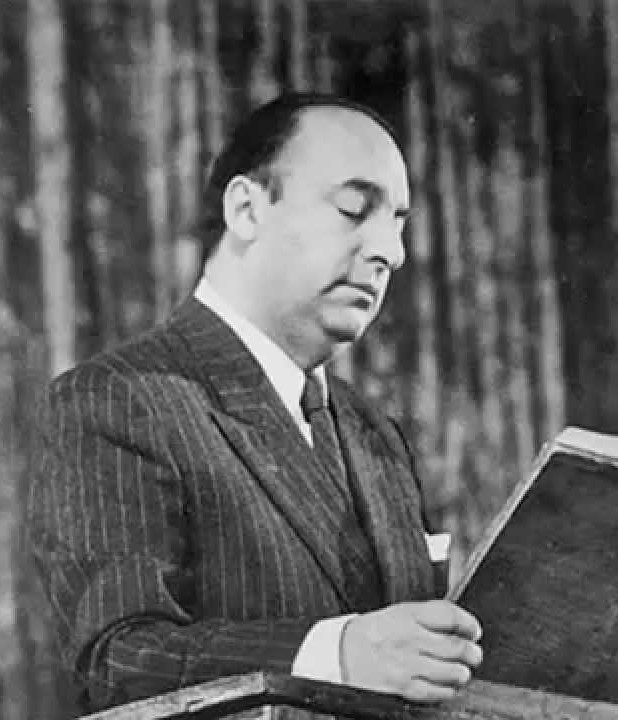
Licenciado en Literatura y Doctor en Educación. Socio de la Sociedad de Bibliófilos Chilenos. Investigador de Booklife Asesorías Editoriales.
Le Pagine dell’Isola
Ignazio Cerio Capri Centre
These pages analyse some writings of Norman Douglas, Oscar Wilde and Pablo Neruda where the unique island of Capri is present. Its authors are Menichelli and Barattolo. They were published in 2003 by Giannini Press of Naples.
The particular beauty of the island and its people, an astonishing combination of peasant and maritime culture, has for centuries attracted various personalities who have enjoyed a unique enclave, a perfect setting for Pablo Neruda who arrives at the Marina Grande in 1952.
Pablo and Matilde settle in Arturo`s House in Vía Tragara, which is kindly loaned for a few months by Edwin Cerio, a protector and scholar of the island’s nature and a point of reference for the writers, artists and scientists who visited it.
The dark house becomes a luminous stage where Matilde is the bearer of light and happiness and, most importantly, becomes the clandestine refuge where her anonymous book The Captain’s Verses will end.
Remember when
in winter
we arrived to the island?
The sea raised toward us
A glass of cold (…)
You inhabited the house
What awaited you dark
And you lit the lamps then …
Menichelli and Barattolo’s text mainly analyses the idyllic figure of Capri in the Captain`s Verses, which sing with lyrical urgency a passionate and sensual love that represents a decisive stage in the artistic process and in the emotional life of the Poet. This sweet and passionate period lived intensely with the woman he loved in the island retreat is transformed, through dazzling poetry, into a happy and renewed expression of beauty and love.
Books
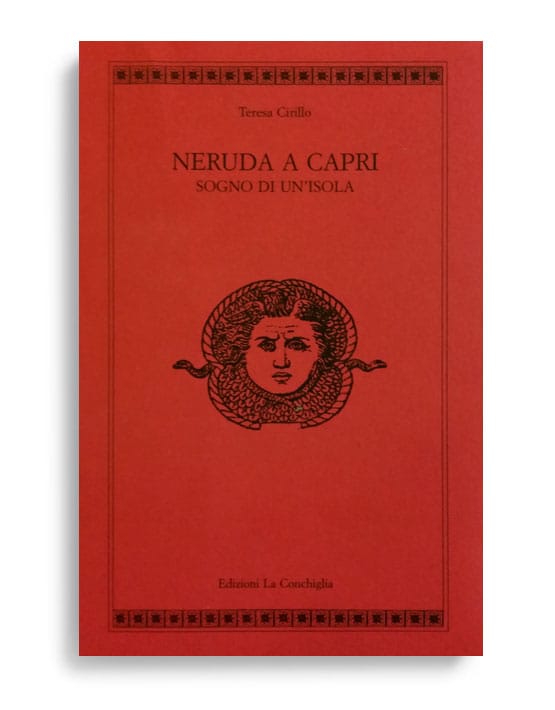
Neruda a Capri. Sogno di una isola.
I created you, I invented you in Italy …
I slept the whole night with you
by the sea, on the island.
Wild and sweet you were between pleasure and sleep,
between fire and water.
Neruda in Capri is a work by Teresa Cirillo Serri, professor of Hispanic American Literature at the Oriental University of Naples.
The book is divided into three chapters: Dreams of an Island, Lovers of Capri and Letters from Capri. In addition, it contains a selection of Neruda`s poems in Spanish and Italian inspired by the heavenly setting and by his lover, Matilde.
Neruda arrived in Capri at the beginning of 1952 because he was looking for a refuge to hide from political persecution and, also, to live his intense love with Matilde. His Italian friends help him so that he is not deported and so that he could live his romance with peace of mind.
The backdrop: the island of stone, moss, ivies, and vineyards in the rock, becomes one of the characters in this story that, told in an entertaining and documented way, recounts a six-month hiatus of joy from the couple in Capri, where for some time they lived in Arturo`s House, a small white house located in a beautiful natural setting, owned by the eminent intellectual and writer from Capri, Edwin Cerio.
The stay in Capri represents the first step towards Neruda’s indissoluble and definitive union with his clandestine love, a fact that is immortalized in the anonymous book The Captain’s Verses, co-financed by Italian personalities and intellectuals, and published in Naples in July 1952.
The reading of this story flows in a dynamic way, nuanced with aspects of the historical context, Neruda’s difficulties to obtain a temporary residence permit, the details of the idyllic love, the days of poetic creation, the meetings with friends and the walks through the hills and corners of the dream island.
Island, from your walls / I detached the little night flower / and I keep it on my chest. / And from the sea turning around you / I made a ring of water / that was left there in the waves, / enclosing the proud towers / of flowered stone, the cracked peaks / that my love held / and will keep with implacable hands / the footprint of my kisses. (The grapes and the wind))
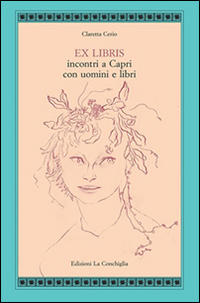
Ex Libris. Encounters in Capri with men and books.
Claretta Cerio
How many things,
limes, thresholds, atlases, cups, nails,
they serve us like unspoken slaves,
blind and strangely stealthy!
They will last beyond our forgetfulness.
They will never know that we are gone.
Ex Libris describes notable characters who passed through the island of Capri. In the chapter dedicated to Pablo Neruda, its author, the Italian-German writer Claretta Wiedermann Cerio, characterizes him as a curious child surrounded by surprising and strange objects that made up his personal universe. This interest seemed to externalize the complex facets of his inner being: curiosity, fantasy, sensitivity, humour, passion.
In the house of Via Tragara he feels at ease, he acquires a sense of security and tranquillity, something that he had lacked until that moment, during his wandering existence as a political exile. At the same time a new life begins with Matilde.
In their Italian refuge, the lovers expressed an overflowing joy that it was necessary to share with those who could understand their language of madness and their complete departure from common sense. Edwin and Claretta got it. They had recently married and were expecting a daughter. At that moment they were infinitely happy and they also wanted to share their happiness, therefore, when all four where together there was a magical element that materialized in a brief and consummate happiness.
Some hint of that feeling can be seen in one of Neruda’s many messages to the couple that, Claretta says, can be read like poetry.
Dear Claretta and Edwin,
Unique friends,
our happiness
greet your happiness.
Tenderly
Pablo and Matilde.
Claretta and Edwin undoubtedly became essential figures in Pablo and Matilde’s life during their stay in Capri. His two dear friends and the dream island are the protagonists of the poem ¨Farewell to the Snow¨ in Memorial de Isla Negra.
Claretta became a prolific German novelist. He passed away in August 2019, at the age of 92.
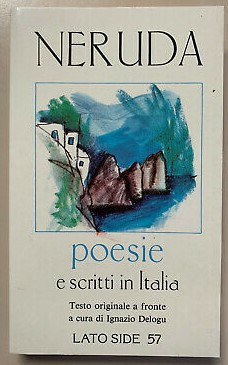
Ignazio Delogu: Poesie e scritti in Italia.
Roma, Lato Side Editori, 1981.
I entered Florence. It was
night. I trembled listening
almost asleep to what the sweet river
told me.
Neruda’s Italian experience is part of the second period of his life and work. In 1949, during the First World Peace Congress in Paris, he reunited with some of his Italian friends and created new ties with others. Among them there were the main intellectuals who contributed to the spread of his art in Italy: Quasimodo, who translated a poetic anthology for Einaudi; Renato Guttuso who illustrated that anthology; Dario Puccini, who was the first Italian translator and scholar of his work and Mario Socrate who collaborated in the translations. The latter published Reading of Canto General in the Turin magazine Società (1950), where he offered the Italian readers the first critical elements for the knowledge of the poet’s work, which is an important fact because, until that moment, he was unknown in Italy.
Neruda’s first visit to Italy was brief, between October and November 1950. On that occasion, he toured Rome with Delia del Carril. This memory was enduring and was reflected in the poem ¨The Fruits¨ in Grapes and the Wind. It was during his second stay in Rome (December 12, 1950 – January 1951) that he met Mario Alicata and Paolo Ricci. This time, he began a trip to some Italian cities. Florence inspired ¨The Sweet River¨ and ¨The Golden Arno¨. In Turin, he was a guest of the Einaudi publishing house. The journey continued to Venice, Milan, and Genoa. In addition, he visited Gabriela Mistral in Rapallo, who at that time was Consul General of Chile.
Neruda returned to Naples at the end of 1951. In those days, a controversial order of expulsion from the country was revoked due to political pressure, and he was allowed to remain in Italy. He settled on the island of Capri, where he wrote most of The Grapes and the Wind and completed and edited the Captain’s Verses. The latter’s edition was Neapolitan and financed entirely by his friends, most of whom were Italian. It is a key book, according to Delogu, without which the life and work of the Poet would be difficult to understand because this pause in Capri allowed extraordinary concentration and encouraged a positive conception of life, beyond poetry.
According to Delogu, 1951 was Neruda’s Italian year. After the publication of ¨Wake up the Woodcutter¨ in Rinascita’s newspaper supplement, the poem was reproduced, disseminated, and widely commented on. Finally, on December 9, marking the end of the Italian poetic cycle, the newspaper L’Unita published it in full on its central page.
Although the first few years of the 1950s were the most significant in Neruda’s incipient relationship with Italy, it is in the 1960s when that relationship was consolidated with the publication of two anthologies: Poetry by Giuseppe Bellini (Milan, Nuova Academia, 1960) and Poetry by Dario Puccini (Florence, Sansoni, 1962). In addition, the anthology translated by Quasimodo was reedited, and was widely disseminated and became a publishing success.
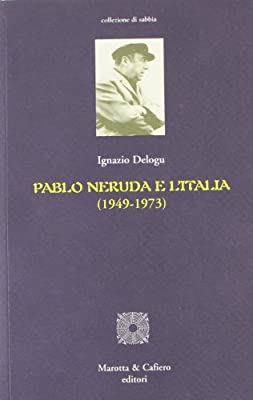
Ignazio Delogu: Pablo Neruda e l’Italia 1949-1973
Motta & Caffiero, Nápoles, 2007.
The richness of Neruda’s poetry is due, among other factors, to the contributions of the various cultures of the countries through which he passed or lived. Italy is undoubtedly at the forefront of them, and Ignazio Delogu, a poet and his friend, reviews in this book the key moments that have linked Neruda to Italy. The work is mainly based on two aspects: the documented testimony of Neruda’s presence in Italy and the critical analysis of his poetry.
Towards the end of October 1950, during his first visit to Italy, Neruda travelled to Rome, where, once again, he met his friend Libero Bigiaretti and came into contact with Moravia, Elsa Morante, Guttuso, Debenedetti and with communist politicians such as Emilio Sereni and Ambrogio Donini. He also met Italian artists and intellectuals of a progressive left line such as Antonello Trombadori, Antonio Scordia, Galvano Della Volpe, Sibila Aleramo, Mario de Micheli and Saltvatore Quasimodo.
In the book, Neruda is described as a strong and independent person, with a dynamic sensual relationship with life, eternally animated by a curiosity that was not only intellectual, but also material. Guttuso remembers him walking through the streets and markets to buy decks of cards, shells and similar objects. For his part, Trombadori remembers him searching for books in the antique shops around Piazza di Spagna and the Roman College.
The “Rabelesian Disposition” of the Poet, his taste for learning about the material culture of the people who welcomed him and his enthusiasm for typical trattoria and Italian cuisine are underlined in the book. He is also frank and generous, but at the same vain and a tireless attention seeker. Mario Socrate says: “He was always surrounded by his court. It was evident that he considered himself the greatest poet in the world”.
Neruda visits Naples at a time of intense cultural activity, where there is a frenzy of renewal and rebirth. Here the friendship between the poet and Dario Puccini is reinforced, and he would become the main Italian scholar who studied his poetry and is an exemplary translator of Canto General. Puccini remembers, ¨ I was Neruda’s love postman, because I put the letters in the mailbox for Matilde. I remember him with emotion and irony. I was his first translator and the first to speak about him in Italy”.
Florence, Venice, Turin, and Genoa are other stages of the Neruda’s presence in Italy, where the poet not only interacts with artists and intellectuals, but also with people from the town, labourers, or simple militants of left-wing parties. During his poetry recitals in factories or crowded rooms, he is always monitored by the police.
Now Neruda intends to spend time in Capri, he receives an expulsion order. This fact provokes the indignation of intellectuals and politicians, but the decision is reversed, and he is authorised to reside in Italy for a few months. From that moment on, Matilde Urrutia enters his life permanently, as is testified in The Captain’s Verses.
Magazine “Nerudiana”, of the Pablo Neruda Foundation. Santiago de Chile, N ° 13-14, March-December 2012. Director: Hernán Loyola.
Congresses, conferences, magazines, book references. Commemorative events to mark the centenary of the birth of the great Chilean poet Pablo Neruda (1904-2004), “From the Mediterranean to the Oceans”. Newsletter N ° 16 (April 2005), in the care of Clara Camplani and Patrizia Spinato Bruschi. Università degli Studi di Milano.
